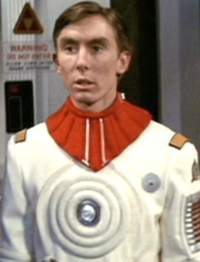Difference between revisions of "Starfleet Line Officers"
CrimsonTacit (talk | contribs) |
CrimsonTacit (talk | contribs) m |
||
| Line 3: | Line 3: | ||
== Fleet Captain == | == Fleet Captain == | ||
[[File:Luther Sloan.png|thumb|200x200px|A section 31 agent, [[ma:Luther_Sloan|Luther Sloan]], posed as a Fleet Captain and the Deputy Director of Internal Affairs, a position with substantial power and influence.]] | [[File:Luther Sloan.png|thumb|200x200px|A section 31 agent, [[ma:Luther_Sloan|Luther Sloan]], posed as a Fleet Captain and the Deputy Director of Internal Affairs, a position with substantial power and influence.]] | ||
Fleet Captain is the highest line officer rank in Starfleet, held by senior starship captains commanding task groups or task forces as well as senior administrators or aides within the numbered fleets and at Starfleet Command. The paths leading to fleet captain vary considerably from officer to officer, as it is often a late career reward for experienced staffers, but a transitional step for starship captains on the fast track to flag ranks. Indeed, some officers are promoted directly from captain to commodore, which makes fleet captain rarer than both the ranks above and below it. The authority carried by fleet captains is highly contextual; a senior captain in command of a small task group would only have authority over their direct subordinates, while a Deputy Director of Internal Affairs might have sweeping fleet-level powers.<gallery> | Fleet Captain is the highest line officer rank in Starfleet, held by senior starship captains commanding task groups or task forces as well as senior administrators or aides within the numbered fleets and at Starfleet Command. The paths leading to fleet captain vary considerably from officer to officer, as it is often a late career reward for experienced staffers, but a transitional step for starship captains on the fast track to flag ranks. Indeed, some officers are promoted directly from captain to commodore, which makes fleet captain rarer than both the ranks above and below it. The authority carried by fleet captains is highly contextual; a senior captain in command of a small task group would only have authority over their direct subordinates, while a Deputy Director of Internal Affairs might have sweeping fleet-level powers. Fleet captains are generally addressed as simply "captain."<gallery> | ||
File:FleetCaptainRed2400.png | File:FleetCaptainRed2400.png | ||
File:FleetCaptainTeal2400.png | File:FleetCaptainTeal2400.png | ||
| Line 11: | Line 11: | ||
== Captain == | == Captain == | ||
[[File:Tryla Scott.png|thumb|200x200px|In the 2360s, [[ma:Tryla_Scott|Tryla Scott]] was the youngest person ever to reach the rank of captain.]] | [[File:Tryla Scott.png|thumb|200x200px|In the 2360s, [[ma:Tryla_Scott|Tryla Scott]] was the youngest person ever to reach the rank of captain.]] | ||
Captain, is as the name suggests, the rank assigned to those officers fortunate enough to be granted the command of a starship. While lower ranking line officers do also hold commands of some smaller starships, the rank of captain carries with it additional prestige and authority, as well as greater access to sensitive information. Starfleet captains are also empowered as ambassadors for the United Federation of Planets, with the ability to negotiate on behalf of the Federation Council. Captains also command starbases and space stations, serve as aides to flag officers, and head up departments on large stations and starships. It is possible to reach this rank without commanding a starship at all, though for an engineer or physician to reach this rank, they would have to be extremely talented and have a long and exemplary service record. <gallery> | Captain, is as the name suggests, the rank assigned to those officers fortunate enough to be granted the command of a starship. While lower ranking line officers do also hold commands of some smaller starships, the rank of captain carries with it additional prestige and authority, as well as greater access to sensitive information. Starfleet captains are also empowered as ambassadors for the United Federation of Planets, with the ability to negotiate on behalf of the Federation Council. Captains also command starbases and space stations, serve as aides to flag officers, and head up departments on large stations and starships. It is possible to reach this rank without commanding a starship at all, though for an engineer or physician to reach this rank, they would have to be extremely talented and have a long and exemplary service record. Most captains have served with Starfleet for at least twenty years before promotion, but there have been notable exceptions such as Tryla Scott and James T. Kirk over the decades. | ||
Captain is also a title and is the correct way of addressing the commanding officer of a starship while they are onboard their own ship, regardless of their actual rank. This courtesy does not extend to the commanding officers of space stations. <gallery> | |||
File:CaptainRed2400.png | File:CaptainRed2400.png | ||
File:CaptainTeal2400.png | File:CaptainTeal2400.png | ||
| Line 27: | Line 29: | ||
== Lieutenant Commander == | == Lieutenant Commander == | ||
[[File:Data2379.png|alt=Lieutenant Commander Data|thumb|200x200px|[[ma:Data|Lieutenant Commander Data]] served as the Second Officer aboard the ''Enterprise-''D and -E, holding the rank for nearly twenty years by the time of his death in 2379.]] | |||
Lieutenant Commander is a mid-level line officer rank often held by starship and station department heads, as well as the executive officers of smaller vessels. Some small starships may also be commanded by lieutenant commanders. This is the highest rank that can be reached by personnel who are not bridge qualified, such as physicians and JAG officers. Most Lieutenant Commanders have at least a decade of service under their belts. Lieutenant Commanders may be correctly addressed as "Lieutenant," as "Commander," or as "Lieutenant Commander."<gallery> | |||
File:LieutenantCommanderRed2400.png | |||
File:LieutenantCommanderTeal2400.png | |||
File:LieutenantCommanderGold2400.png | |||
</gallery> | |||
== Lieutenant == | == Lieutenant == | ||
[[File:Shaxs.png|thumb|206x206px|[[ma:Shaxs|Lieutenant Shaxs]] served as the Chief Security Officer aboard the [[ma:USS_Cerritos|USS ''Cerritos'']] in the 2380s.]] | |||
Lieutenant is a junior officer rank held by shift leaders and department heads at all levels of the fleet. Reaching the rank of lieutenant represents reaching a significant level of expertise and experience in one's field and the transition from mentee to mentor. Lieutenants typically have at least four years of service before reaching this rank, though six to ten years in lower ranks is also a common career path. <gallery> | |||
File:LieutenantRed2400.png | |||
File:LieutenantTeal2400.png | |||
File:LieutenantGold2400.png | |||
</gallery> | |||
== Lieutenant Junior Grade == | == Lieutenant Junior Grade == | ||
Revision as of 21:09, 13 November 2022
Starfleet Line Officers represent the bulk of the members of Starfleet holding officer ranks, with responsibilities ranging from the command of starship to junior staff positions on minor outposts. Line officers are subordinate to flag officers and have authority over more junior line officers and all non-commissioned officers. There are eight line officer ranks.
Fleet Captain

Captain

Captain, is as the name suggests, the rank assigned to those officers fortunate enough to be granted the command of a starship. While lower ranking line officers do also hold commands of some smaller starships, the rank of captain carries with it additional prestige and authority, as well as greater access to sensitive information. Starfleet captains are also empowered as ambassadors for the United Federation of Planets, with the ability to negotiate on behalf of the Federation Council. Captains also command starbases and space stations, serve as aides to flag officers, and head up departments on large stations and starships. It is possible to reach this rank without commanding a starship at all, though for an engineer or physician to reach this rank, they would have to be extremely talented and have a long and exemplary service record. Most captains have served with Starfleet for at least twenty years before promotion, but there have been notable exceptions such as Tryla Scott and James T. Kirk over the decades.
Captain is also a title and is the correct way of addressing the commanding officer of a starship while they are onboard their own ship, regardless of their actual rank. This courtesy does not extend to the commanding officers of space stations.Commander

Lieutenant Commander

Lieutenant
Lieutenant Junior Grade
Ensign
Midshipman

